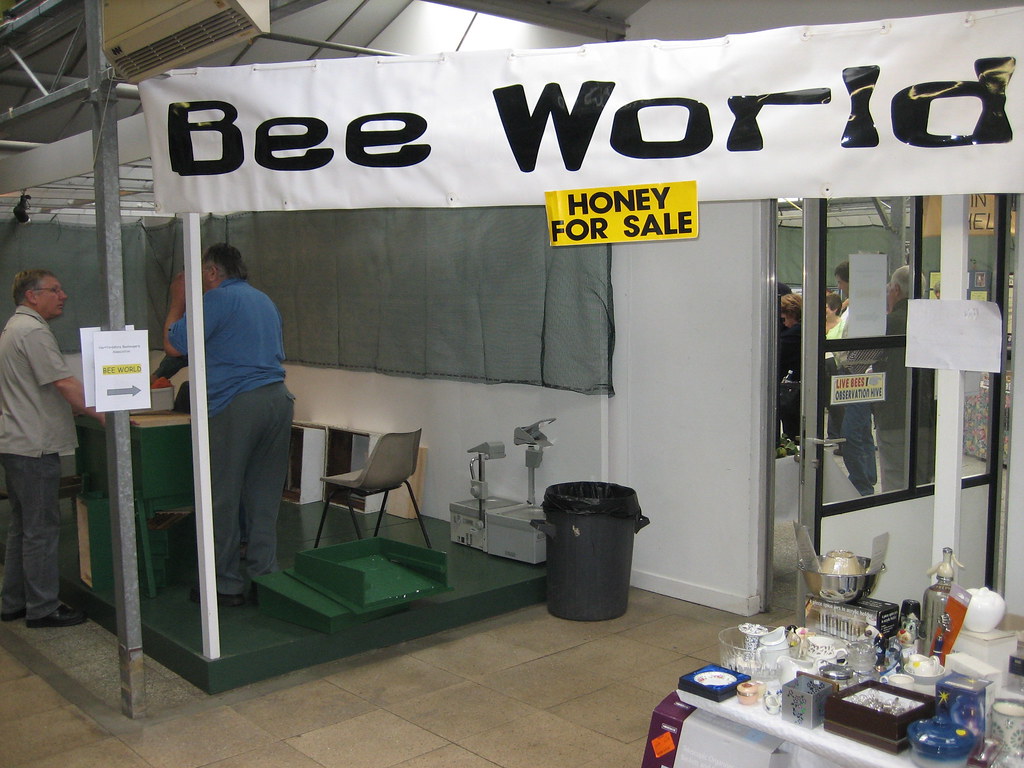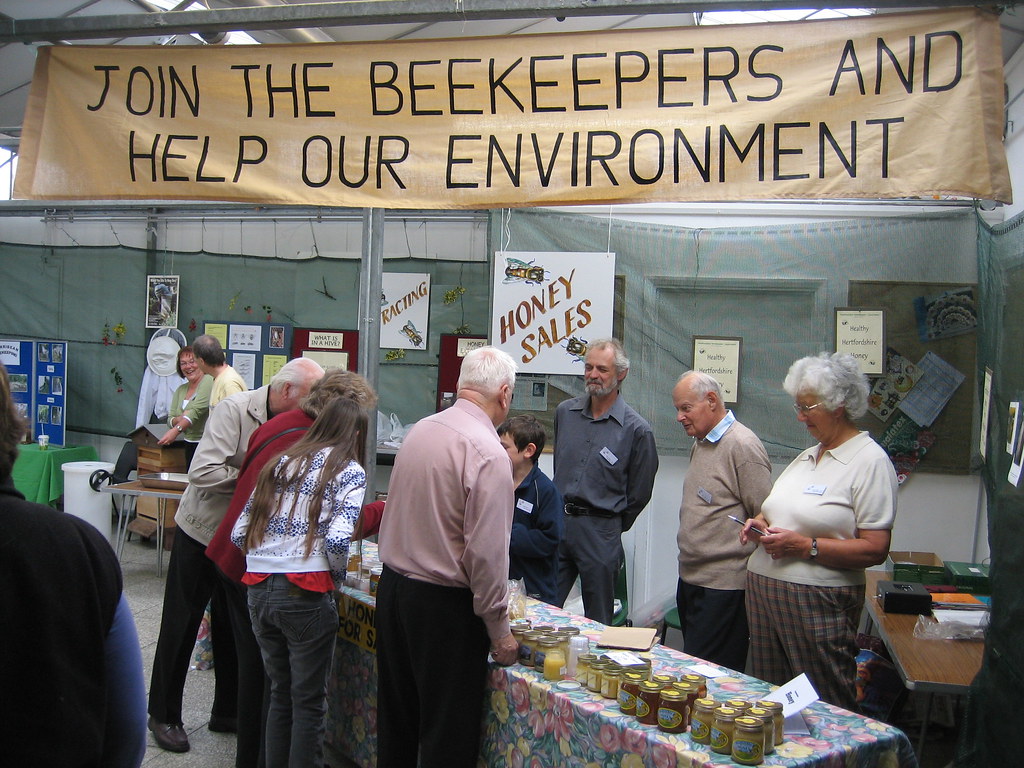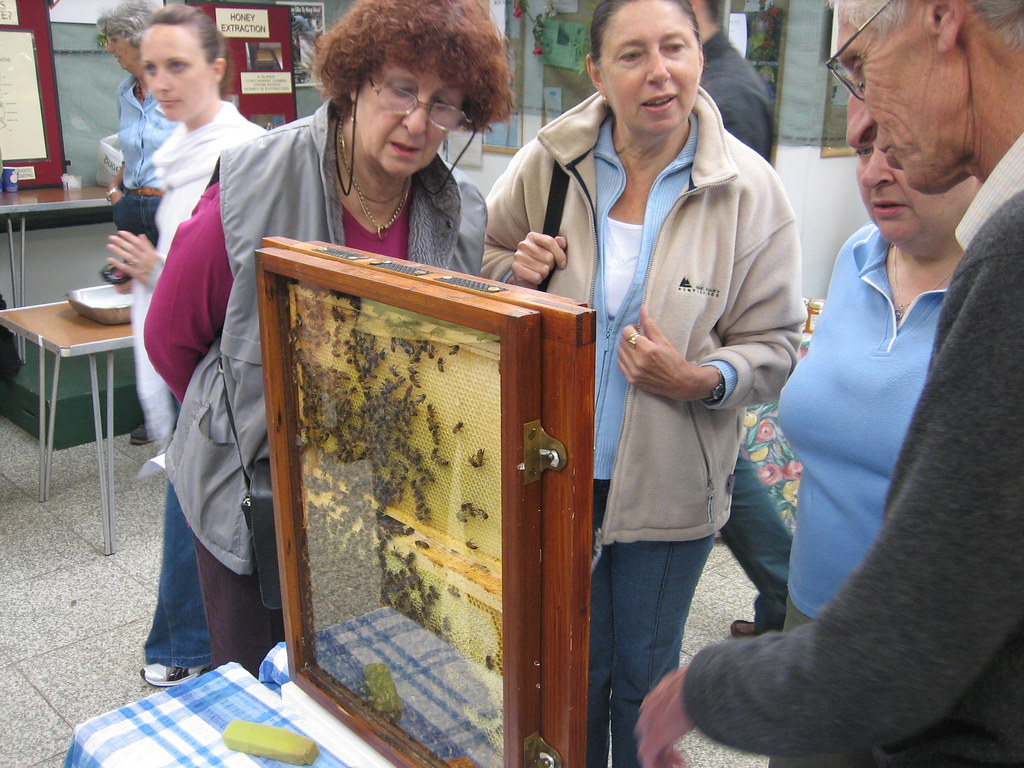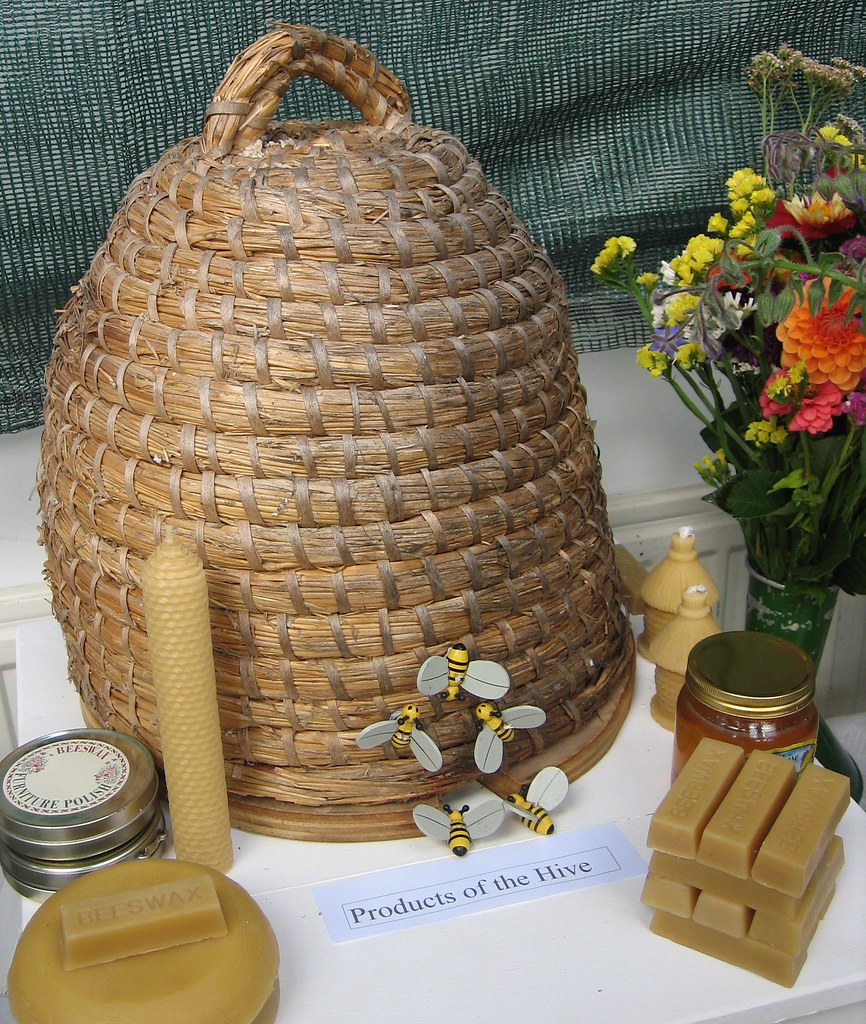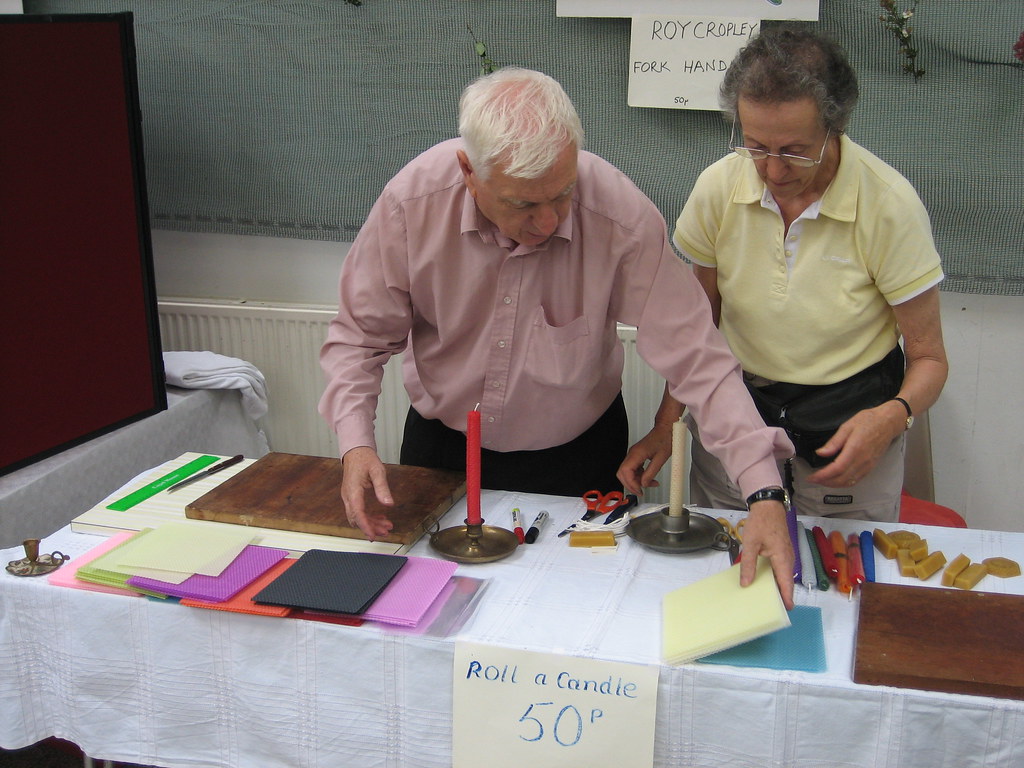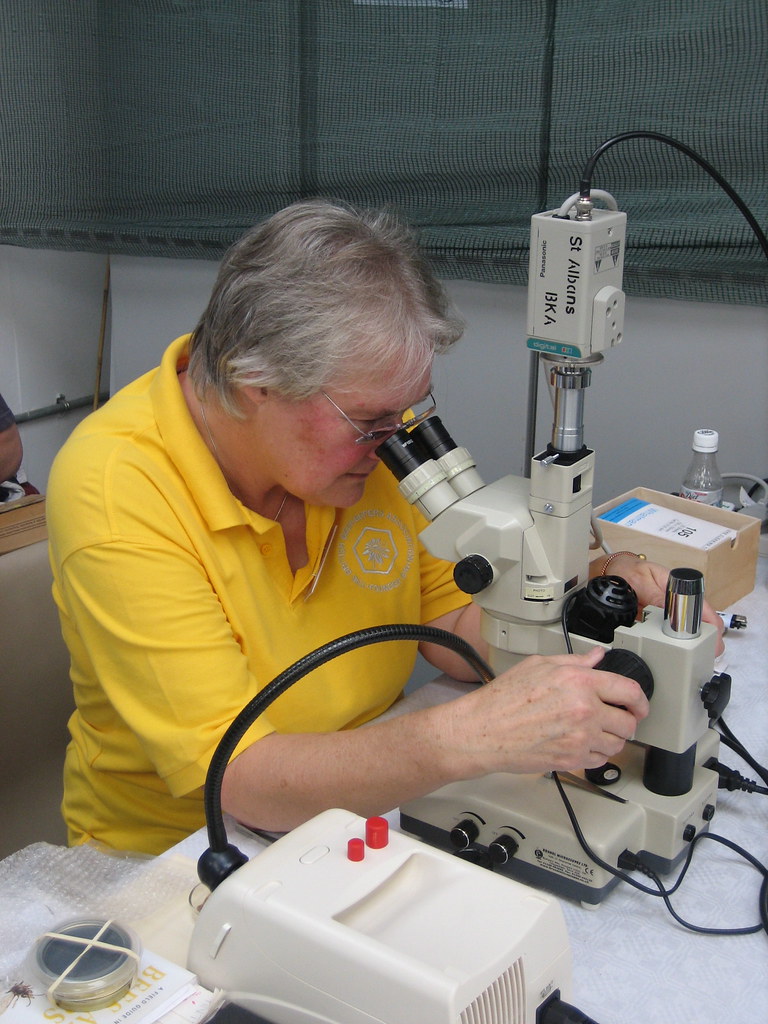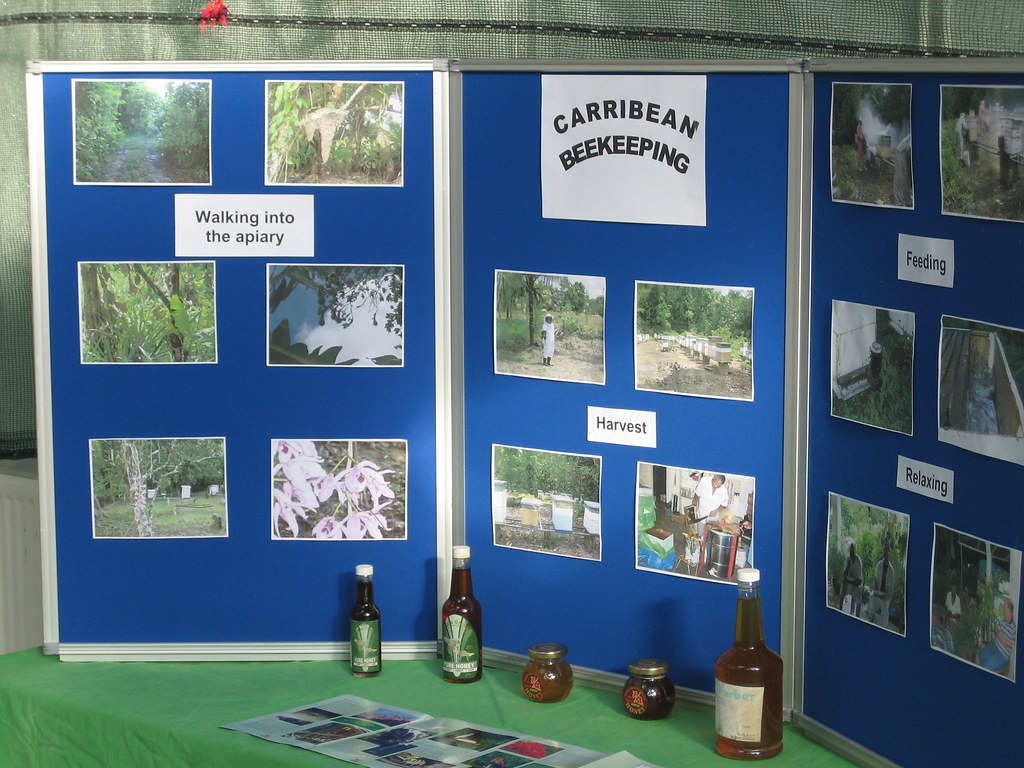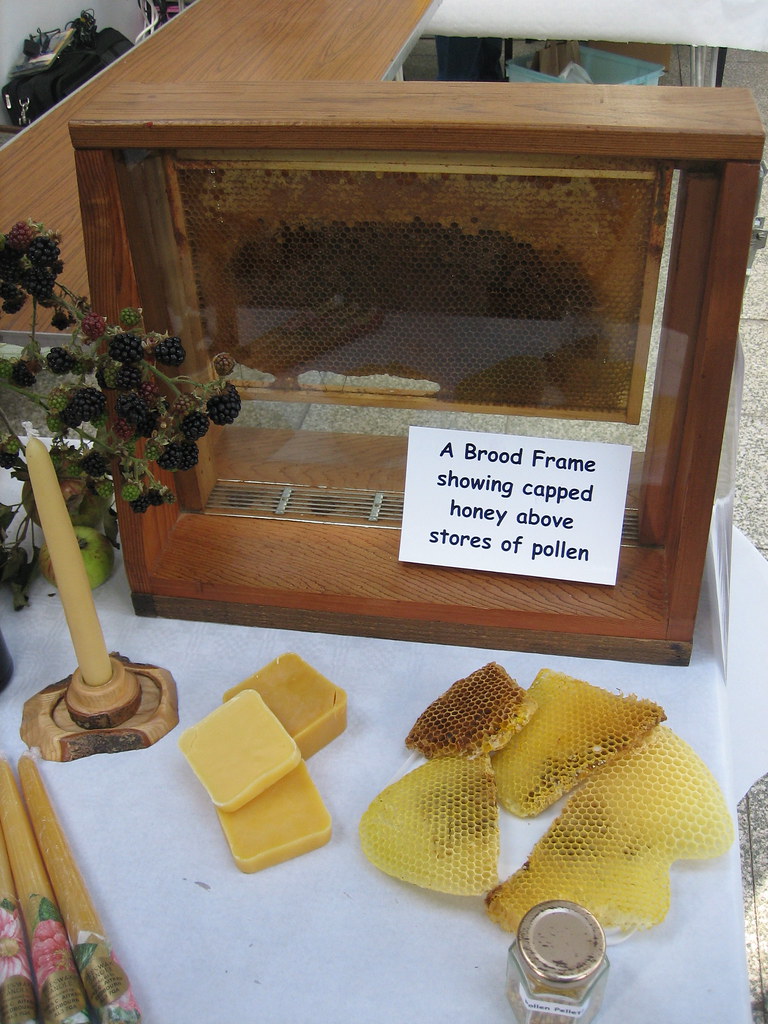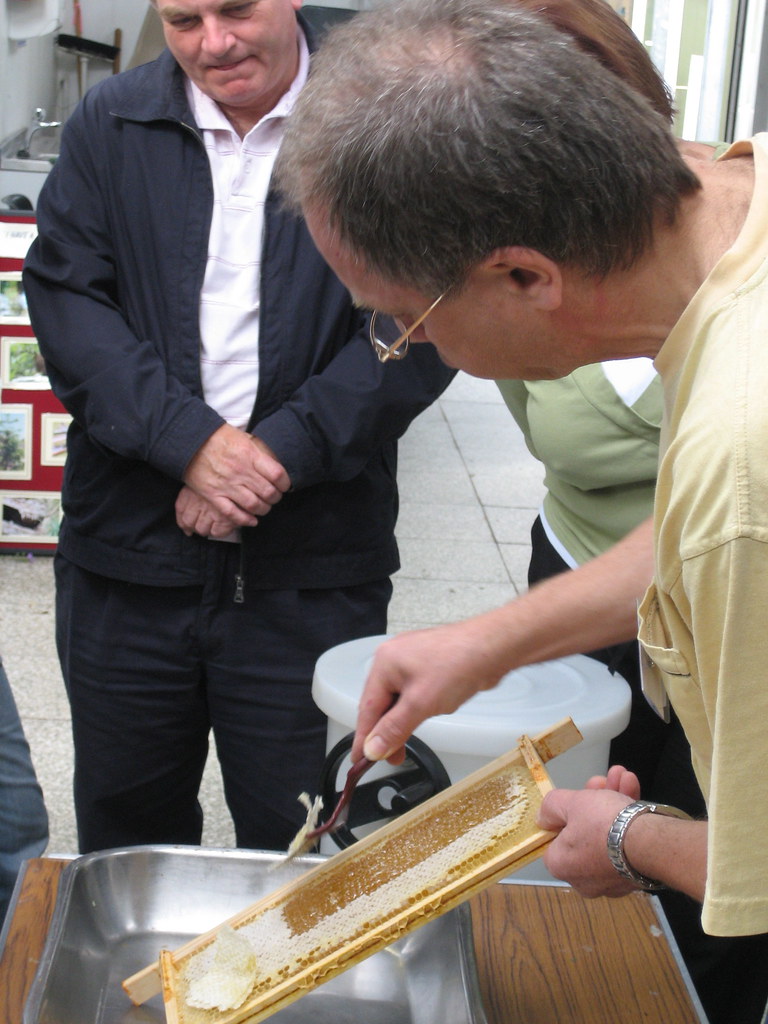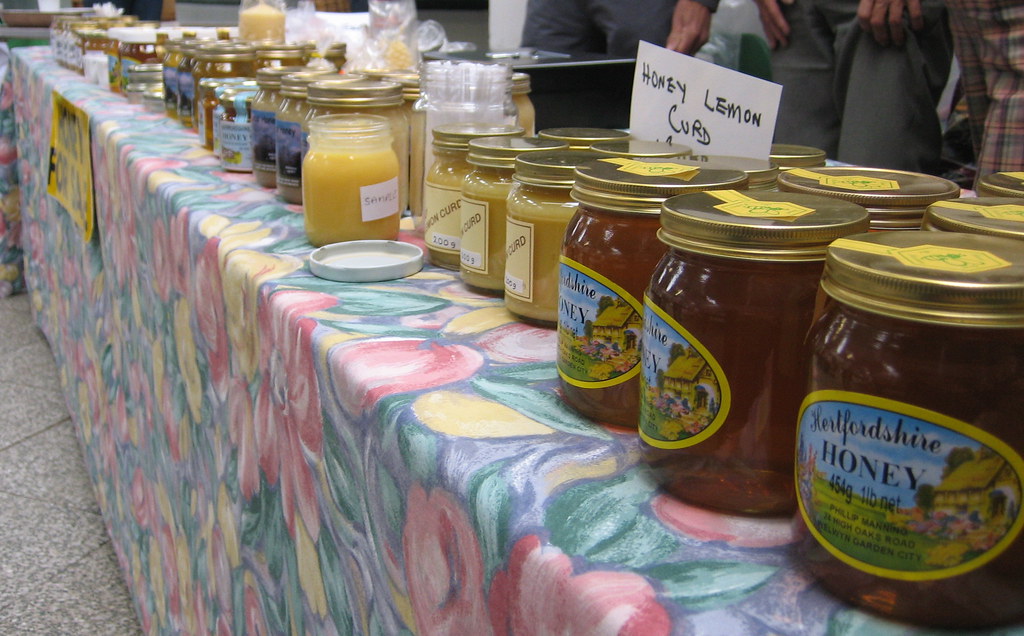St Albans news by Anne Wingate
I hope all your colonies are now settled for the winter. Time to take a breather before you start with the lectures which will be at the United Reformed Church, Watford Road, Chiswell Green, St Albans at 8.00 pm. 26th October. The topic is "Swarming", come and listen, and give us your first year's wisdom on the subject!
Me And My Solar by Roy Cropley
The best and easiest way of recovering wax from old combs is by using the solar wax extractor. Like all aspects of beekeeping it is open to criticism but I would not be without one. The question arises whether it is worthwhile trying to get wax from old combs. Since a comb starts life with only an ounce or so of wax that is all each old comb will produce.
Old comb should be replaced regularly. A good start to the year is to put the bees on to foundation and feed with sugar syrup. Without all the work of dealing with old pollen, solid honey and millions of bacterial and disease pathogens the bees will soon build up a strong colony. Some beekeepers extol the virtue of old combs and boast their age. We are told not to use old combs from an unknown source but our own could quite well be unreliable. The modern thinking is to get rid of them and replace them with new. Some work is involved but it will soon repay itself. When the old brood chamber is replaced at the end of March some brood will be lost. I find this hard to bear but it is worth it. Gone will be most of the varroa together with the other nasties that plague our bees. There may be combs from colonies that have died out. I don't use those again but recover the wax.
Each beekeeper will have a way of disposing with old wax. One man tells me he puts it in a dustbin so it goes to landfill - not something I approve of. Another has a bonfire.. And it can be buried in the garden.
I put my old combs, four at a time, into a piece of net curtain and into the solar wax extractor. Then I pray for sun. It is fascinating to know that sometimes in the summer we go for days without sunshine. And then we get a spell when I can refill the extractor more than once in a day.
I am always amazed at how clean the wax is even from old black combs. It comes out a beautiful yellow colour with a pleasant smell with little pollen and propolis. The residue of moulted skins and pollen, called slumgum, still contains a fair bit of wax which is not economic to extract. This burns very well on the coal fire. There are firms abroad that will buy it.
When there is wax in the recepticle it is removed when cool; I pour boiling water over the upturned container. I get lots of misshapen bits of wax, some small. The important thing is their colour. I wash the honey from the wax and let it dry. Some solars have mild steel or tinplate parts which soon go rusty and impart a greenish colour to the wax. Stainless steel or aluminium are best.
It is a mistake to leave the solar wax extractor for several days and allow the collected wax to heat and cool several times. This gives an inferior wax, dark in colour and of poor texture. It is still usable but not so good as that obtained after each day of sunshine.
I not only recover wax from my own old brood combs; I also buy wax from other beekeepers. For best quality blocks I pay £1.50 a pound, more than the firms that buy wax. I exchange wax for foundation with the firm KBS run by Peter Kemble in Hastings who produces the best foundation in the country. I sell his foundation at about 30% less than catalogue prices. Sometimes I am asked if I want wax which has gone mouldy. My answer is yes. I will melt it in rain water, filter and allow it to cool in an insulated box for several hours. The block will be free of honey and pollen. It is not attractive to bees and will not go mouldy. Wax moth do not attack clean wax. Wax chandlers store theirs outside. I am often offered wax complete with mouldy pollen and wax moth. If the bees have had nosema or any other disease this will not be present in the foundation made from it. Even AFB spores which are not killed when the foundation is made are rendered inactive. Bees cannot contract any disease from foundation. A few beekeepers spread alarm by saying that medication used to treat varroa finds its way into foundation. My answer is 'Not Proven', And when you see how a shook swarm works foundation if fed there is no case to answer.
If you have a solar then use it. Empty the recepicle each time it has collected any wax. Don't worry about shape or size; the important thing is not to leave and honey in the pan to reheat. Find all the old wax in your shed and we can put it to use. You can trade directly with KBS, or see me at the Essex Conference or call on ☏.
Old comb should be replaced regularly. A good start to the year is to put the bees on to foundation and feed with sugar syrup. Without all the work of dealing with old pollen, solid honey and millions of bacterial and disease pathogens the bees will soon build up a strong colony. Some beekeepers extol the virtue of old combs and boast their age. We are told not to use old combs from an unknown source but our own could quite well be unreliable. The modern thinking is to get rid of them and replace them with new. Some work is involved but it will soon repay itself. When the old brood chamber is replaced at the end of March some brood will be lost. I find this hard to bear but it is worth it. Gone will be most of the varroa together with the other nasties that plague our bees. There may be combs from colonies that have died out. I don't use those again but recover the wax.
Each beekeeper will have a way of disposing with old wax. One man tells me he puts it in a dustbin so it goes to landfill - not something I approve of. Another has a bonfire.. And it can be buried in the garden.
I put my old combs, four at a time, into a piece of net curtain and into the solar wax extractor. Then I pray for sun. It is fascinating to know that sometimes in the summer we go for days without sunshine. And then we get a spell when I can refill the extractor more than once in a day.
I am always amazed at how clean the wax is even from old black combs. It comes out a beautiful yellow colour with a pleasant smell with little pollen and propolis. The residue of moulted skins and pollen, called slumgum, still contains a fair bit of wax which is not economic to extract. This burns very well on the coal fire. There are firms abroad that will buy it.
When there is wax in the recepticle it is removed when cool; I pour boiling water over the upturned container. I get lots of misshapen bits of wax, some small. The important thing is their colour. I wash the honey from the wax and let it dry. Some solars have mild steel or tinplate parts which soon go rusty and impart a greenish colour to the wax. Stainless steel or aluminium are best.
It is a mistake to leave the solar wax extractor for several days and allow the collected wax to heat and cool several times. This gives an inferior wax, dark in colour and of poor texture. It is still usable but not so good as that obtained after each day of sunshine.
I not only recover wax from my own old brood combs; I also buy wax from other beekeepers. For best quality blocks I pay £1.50 a pound, more than the firms that buy wax. I exchange wax for foundation with the firm KBS run by Peter Kemble in Hastings who produces the best foundation in the country. I sell his foundation at about 30% less than catalogue prices. Sometimes I am asked if I want wax which has gone mouldy. My answer is yes. I will melt it in rain water, filter and allow it to cool in an insulated box for several hours. The block will be free of honey and pollen. It is not attractive to bees and will not go mouldy. Wax moth do not attack clean wax. Wax chandlers store theirs outside. I am often offered wax complete with mouldy pollen and wax moth. If the bees have had nosema or any other disease this will not be present in the foundation made from it. Even AFB spores which are not killed when the foundation is made are rendered inactive. Bees cannot contract any disease from foundation. A few beekeepers spread alarm by saying that medication used to treat varroa finds its way into foundation. My answer is 'Not Proven', And when you see how a shook swarm works foundation if fed there is no case to answer.
If you have a solar then use it. Empty the recepicle each time it has collected any wax. Don't worry about shape or size; the important thing is not to leave and honey in the pan to reheat. Find all the old wax in your shed and we can put it to use. You can trade directly with KBS, or see me at the Essex Conference or call on ☏.
SE Herts news by John Mumford
The September Association Apiary Meeting I am told was well attended, and the bees found in fine fettle. Laying Queens and plenty of stores should see them through the most severe winter. They have now been given their Thymol Treatment. One is showing signs of a high mite population (deformed wings) but I’m sure they will come through OK. I am now half way through extracting their honey which will be about 100lbs. Any members wishing to purchase some honey in tubs or jars should give me a ring. The surplus is not bad for such a difficult year with so much swarming going on. I was bringing bees back from the North York Moors and so unable to attend the meeting myself.
I was please to get such a good response to my request for help with the Bee World event. Phil Amer, John Dockerill (a new member who has no bees at present), Andrew Watters, and Janice Nicholson who is of course a Barnet member, together with those who didn’t let me know they were coming. I trust they all had an interesting and enjoyable day. Denis Osbourne did a very good job of the organizing the event and I am obliged to Alan Lewis for the loan of his Workmate to hold the Observation Hive.
The committee are proposing to run another beginners course at the Hoddesdon Baptist Church Hall on Sundays 17th and 24th February and 2nd, 9th, and 16th March from 2.00pm till 4.00pm. Anyone interested should contact Derek Driver for more details.
The Harvest Supper is on Saturday 13th October at 7.30pm for 8.00pm with carriages at 11.00pm. It is free to members and their partners, and to members children. Visitor £3.00 each. Raffle prizes would be appreciated. Bring along a jar of your very best honey (unlabeled) and compete for the Skillman Shield. Please let Derek Driver (☏) or myself know if you will be attending so that proper provisions can be made.
Erratum – Counting Varroa Mites
I am trying to get to grips with some new technology - a new Computer - with an awkward Word Processor and American Spellcheck, and must correct the piece in last months news letter. Anno Domini I suspect is also partly to blame. The 5th paragraph should read:
I was please to get such a good response to my request for help with the Bee World event. Phil Amer, John Dockerill (a new member who has no bees at present), Andrew Watters, and Janice Nicholson who is of course a Barnet member, together with those who didn’t let me know they were coming. I trust they all had an interesting and enjoyable day. Denis Osbourne did a very good job of the organizing the event and I am obliged to Alan Lewis for the loan of his Workmate to hold the Observation Hive.
The committee are proposing to run another beginners course at the Hoddesdon Baptist Church Hall on Sundays 17th and 24th February and 2nd, 9th, and 16th March from 2.00pm till 4.00pm. Anyone interested should contact Derek Driver for more details.
The Harvest Supper is on Saturday 13th October at 7.30pm for 8.00pm with carriages at 11.00pm. It is free to members and their partners, and to members children. Visitor £3.00 each. Raffle prizes would be appreciated. Bring along a jar of your very best honey (unlabeled) and compete for the Skillman Shield. Please let Derek Driver (☏) or myself know if you will be attending so that proper provisions can be made.
Erratum – Counting Varroa Mites
I am trying to get to grips with some new technology - a new Computer - with an awkward Word Processor and American Spellcheck, and must correct the piece in last months news letter. Anno Domini I suspect is also partly to blame. The 5th paragraph should read:
“So, if we make an average daily mite count over days 6, 7, and 8 after the treatment is first applied, and we make another average mite daily count over days 18, 19, and 20 after the treatment was first applied and the treatment is refreshed on day 13, the second average divided by the first average will give the SURVIVAL RATIO.”
BuzzWorks (previously the Hitchin Bee Centre) by Robin Dartington
The summer has flown by – and missed the UK almost completely. But it has been a bumper year for honey in Hitchin and the surplus will be useful to raise money for good works. My planned 16 colonies seem to have grown to 29 so there will be surplus bees for the Bee Centre.
The outer shell of the Bee Shed is finished, the interior now needs painting and fitting out. The working group has grown with the enthusiastic contribution of Elaine from Letchworth who wants to take up beekeeping. Her son, Edmund, also wants to become a beekeeping apprentice – a young back is always welcome when it comes to the heavy work!
 Elaine putting on the paint
Elaine putting on the paint
A higher quality Museum and Exhibition will take costs of Phase 2 to £20,000 – but the grant lady did not blink. The job is to steer the design closer to the guidelines, not go for cheapness. Luton’s Bee Gallery is an invaluable precedent, to which Beds BKA contributed £2,200.
We have a new name,
’BuzzWorks’
Hitchin’s Community Bee Garden
“where people enter and enjoy the busy world of bees”
It will stand until someone comes up with better! Any ideas, anyone?
The outer shell of the Bee Shed is finished, the interior now needs painting and fitting out. The working group has grown with the enthusiastic contribution of Elaine from Letchworth who wants to take up beekeeping. Her son, Edmund, also wants to become a beekeeping apprentice – a young back is always welcome when it comes to the heavy work!
 Elaine putting on the paint
Elaine putting on the paintThe grant manager has visited and the Museum/Exhibition and Bee Garden appear to fall within the guidelines but not the Plant Nursery, which will now be added to the privately funded Bee Centre. An Operational Plan is needed to show how the obligation for the Museum to be open to the public for 104 days a year will be met. The Council will also need to extend the annual lease, so applying for the grant will be delayed to the end of the year. More time on developing a design is never wasted, but it will be a rush in the spring to get ready for opening at Easter.
A higher quality Museum and Exhibition will take costs of Phase 2 to £20,000 – but the grant lady did not blink. The job is to steer the design closer to the guidelines, not go for cheapness. Luton’s Bee Gallery is an invaluable precedent, to which Beds BKA contributed £2,200.
We have a new name,
’BuzzWorks’
Hitchin’s Community Bee Garden
“where people enter and enjoy the busy world of bees”
Wax Moth Bait by Ron Pitt
A bait for trapping wax moth and other undesirables was printed in BBKA NEWS Feb. 2004 p.8 as follows:
1 cup each of water, sugar,vinegar in a lemonade bottle and mix well. Cut a 25mm dia. hole in the bottle just below the shoulder, add a banana and hang head high near the hives.
I tried it this year from Spring to late August and found the contents to be:- 14 wax moths, 12 hornets, dozens of wasps and dozens of various flies all in one gungey mess. It works!
Ron Pitt (Welwyn)
1 cup each of water, sugar,vinegar in a lemonade bottle and mix well. Cut a 25mm dia. hole in the bottle just below the shoulder, add a banana and hang head high near the hives.
I tried it this year from Spring to late August and found the contents to be:- 14 wax moths, 12 hornets, dozens of wasps and dozens of various flies all in one gungey mess. It works!
Ron Pitt (Welwyn)
Welwyn news by Peter Mathews
The next Apiary meeting on Saturday 6th October, will be at Peter Folge's parents 23, Canonsfield Road. Welwyn AL6 0PY. Please RSVP to Peter if you wish to attend. The format will be more social and dealing with questions that have occurred during the summer. (☏)
The summer continues to surprise with a swarm at the beginning of September and full supers during the middle of the month. As to when varroa treatment and feeding can be fitted in is an open question. I am hoping to get away with some fast work this month.
A new apiary site has been offered to us. This is in the Danesbury/Potters Heath area of Welwyn and is set in an apple orchard. Let me know if you are interested in putting your hives there. At the time of writing, I have yet to inspect the site. However, I am assured that the location is quite secure and will need key access (provided).
North Herts news by John Hill
“It’s all over bar the shouting”, I suppose that is an apt saying as far as the end of the beekeeping year of 2007 is concerned. (Wondering where the expression comes from?... I’ve just looked it up in Nigel Rees’s recent book “A Word in Your Shell Like” (£8.99 Collins), a book of curious Phrases, and it says that it is of sporting origin, generally attributed to the shouting aspect of the crowd in appealing against the referee (in Boxing), the earliest use of the phrase was used was in 1842).... Now back to “them bees”,..... it’s been a ‘funny old year’;... some of us have had reasonable-to-good yields of honey and others, like me and FE who missed the rape and field beans, have had what can only be described as a disastrous time. Although during the past month or so, the two/three colonies of mine have increased in numbers quite markedly, and have taken down large amounts of syrup feed. I treated them with Thymol/sugar/Pura mixture, as advised... the bees didn’t seem to have taken much notice of it, and now have had a second treatment after two weeks. So much for science! No sign of Varroa whatsoever,.. even before treatment with the “miticide”. The latter means “any drug or agent that destroys mites”, (according to my dictionary ,....found by accident, the word not the dictionary!).
Andy Johnston’s meeting at Shillington was well attended by about 25 beekeepers from both Herts. and Beds. associations. What could be described as a very lively session or two transpired as a number of hives were opened to display the various features and idiosyncrasies of Andy’s techniques. Quite a number of attendees were literally covered by the inquisitive “inhabitants”.
Some wonderful refreshments followed, prepared by Val,... thank you both for making the event so worth while, ... “feed the mind and the body”.
By the time members read this, the event “Bee World” will have happened, and I hope will be reported elsewhere,... I should warn North Herts. members that we are organising next year,!!! So I hope quite a number of you attended!
I can now mention the details of our first two Winter/ Spring meetings at The Friends’ Meeting House, Sollershott East, Letchworth, at 7.30 p.m. on Tuesday October 9th, and November 13th. 2007. Our new Chairman, Graham Beasley has been very active in persuading the attendance of two well known speakers to come and give us the following talks and promote discussion and to share experiences etc.
Let’s hope we get plenty of support for both these talks as both speakers are coming some distance to be with us, and I’m sure we are in for two very interesting evenings.
I’ve ‘blathered’ on rather a lot, and I know you just can’t wait for the answer to last month’s puzzle!.. and with space at a premium, I’d better “get on with it”. The answer was “Four”. If you want to know how to get to this you will have to ring me!!!
Here’s a difficult one! What major scientific blunder did Shakespeare include in “Twelfth Night”?
Now finally:
“Laughter is much more important than applause. Applause is almost a duty. Laughter is a reward. Laughter means they trust and like you!” Attrib. to Carol Channing,... Star of US cabaret. b 1921.
Andy Johnston’s meeting at Shillington was well attended by about 25 beekeepers from both Herts. and Beds. associations. What could be described as a very lively session or two transpired as a number of hives were opened to display the various features and idiosyncrasies of Andy’s techniques. Quite a number of attendees were literally covered by the inquisitive “inhabitants”.
Some wonderful refreshments followed, prepared by Val,... thank you both for making the event so worth while, ... “feed the mind and the body”.
By the time members read this, the event “Bee World” will have happened, and I hope will be reported elsewhere,... I should warn North Herts. members that we are organising next year,!!! So I hope quite a number of you attended!
I can now mention the details of our first two Winter/ Spring meetings at The Friends’ Meeting House, Sollershott East, Letchworth, at 7.30 p.m. on Tuesday October 9th, and November 13th. 2007. Our new Chairman, Graham Beasley has been very active in persuading the attendance of two well known speakers to come and give us the following talks and promote discussion and to share experiences etc.
- Tuesday , October 9th. Andy Wattam, the East Region Bee Inspector will give a talk entitled, “Integrated Pest Management, (with reference to EFB and Oxallic Acid Treatment)”.
- Tuesday, November 13th. Martin Buckle, from Beds. Association, will speak about “Honey, ... it’s Bottling and Presentation for Showing”. Members are asked to bring samples for, what might be called “Constructive Criticism”!!!
Let’s hope we get plenty of support for both these talks as both speakers are coming some distance to be with us, and I’m sure we are in for two very interesting evenings.
I’ve ‘blathered’ on rather a lot, and I know you just can’t wait for the answer to last month’s puzzle!.. and with space at a premium, I’d better “get on with it”. The answer was “Four”. If you want to know how to get to this you will have to ring me!!!
Here’s a difficult one! What major scientific blunder did Shakespeare include in “Twelfth Night”?
Now finally:
“Laughter is much more important than applause. Applause is almost a duty. Laughter is a reward. Laughter means they trust and like you!” Attrib. to Carol Channing,... Star of US cabaret. b 1921.
Eva Crane dies aged 95
Eva Crane (12 June 1912 – 6 September 2007) was a researcher and author on the subjects of bees and beekeeping. She spent decades researching bees, traveling to more than 60 countries.
Eva Crane's Wikipedia entry
Eva Crane's Wikipedia entry
30lb honey buckets for sale
...from the Potters Bar area. Please contact the Herts Bees editor for the seller's contact details.
Foul brood or not foul brood?
by Paul Cooper
There was a strong, pungent, bitter smell from two of my five hives when I did an inspection at the weekend. So I called in Peter Heath (Seasonal Bee Inspector) given the recently reported outbreak of EFB near Lower Stondon in Bedfordshire. Anyone who suspects a notifiable bee disease should call in a bee inspector as you cannot be too cautious.
Thankfully Peter confirmed that it was just the smell of the Ragwort nectar that my bees had been collecting. He advised that I should have started varroa treatment sooner (end of July) but apart from this my bees are in good health.
There was a strong, pungent, bitter smell from two of my five hives when I did an inspection at the weekend. So I called in Peter Heath (Seasonal Bee Inspector) given the recently reported outbreak of EFB near Lower Stondon in Bedfordshire. Anyone who suspects a notifiable bee disease should call in a bee inspector as you cannot be too cautious.
Thankfully Peter confirmed that it was just the smell of the Ragwort nectar that my bees had been collecting. He advised that I should have started varroa treatment sooner (end of July) but apart from this my bees are in good health.
NE Herts news by John Hill
Another Summer nearly gone, and what have we beekeepers to show for it? At least the colonies seem to be increasing in size and creating some food for the Winter, but the ‘Boxwood Bunch’ have not produced much crop worth extracting, although a couple of supers need some attention, mainly from swarms. The ‘indigenous’ colonies are just about pulling themselves together, but it’s getting rather late in the season, and we’ve now come to treatment time. I’ve had a go at making some Thymol ‘Patties’ this time. F.E. managed to get some crystals from Thornes (all done in a rush,.. the making I mean.. which beekeeper plans ahead?) Well, fortunately I decided to heat the fat in the kitchen, and to mix it with the sugar and Thymol outside on the lawn!! Organic Chemistry was my bete noir!! Good job I did, ... because the Thymol smell is very penetrable, and afterwards my clothes all smelt as though I just emerged from a heavy day on the ‘ointment’, and had to commit all my clothes to the wash, even down to my vest!! The ‘patties ‘ I created by scraping some on to ‘fairy-cake’ , greaseproof, papers ...32p for 100!! The paste was quite mouldable but I had to add about 30 grms more fat that the recipe amount of 200 grms to make it so. Let’s hope it does some good,..BUT don’t make in in the house unless you want to smell like a refugee from a chemical factory! I put 3 patties per hive, directly on top of the brood box (moving any sealed crop first!).
I missed some of the Summer meetings due to holiday and trips to family etc. but F.E. gave me some notes, which I repeat below verbatim:-
There was also a meeting at Pat Veasey’s apiary, but unfortunately I cannot report on it as I wasn’t there and it’s rather along time back too. But no doubt the refreshments were excellent, as usual,...let’s get our priorities right!! Thanks to Pat and Jennifer.
Well, at the time of writing , our last meeting will be in two days. Andy Johnston is having a joint meeting with Beds, group. I’ll report next time.
Just space for last edition’s puzzle answer: "There is one sec. between two strikes, therefore it will take 11 secs. for the clock to strike 12 times".
And a little more! "If one half of 24 were 8, what would one third of 18 be?"
Did you know that the word........"Uncopyrightable" is the longest word in ‘common use’ with no letter appearing more than once. Here’s another long word of 45 letters which is in some dispute because it is really a made up word........ "Pneumonoultramicroscopicsilicovolcanoconiosis", which is a lung disease,... perhaps our bees could get it?!!!
I missed some of the Summer meetings due to holiday and trips to family etc. but F.E. gave me some notes, which I repeat below verbatim:-
“At Roman Gorski's apiary meeting (a first for the North Herts Beekeepers), 13 visitors turned up, including welcome guests from St Albans. The rain stopped as we arrived, and started again as we were leaving. Somebody must love us! However, the conditions were not propitious for opening hives, so Roman showed us some of the more even-tempered colonies amongst the 30 or so at his crowded apiary. Despite this, several stings were suffered as a result of bees chasing us, presumably from the less well-tempered colonies.I did go the Nortonbury meeting, along with about 15 attendees, including some new prospective members, also in attendance was Peter Heath who led the practical aspects and contributed markedly to the discussion.... “Thank you Peter, from all who went along”. We had some wonderful ‘al fresco’ refreshments.... shades of camping. The ladies did some very smart cakes and sandwiches,” thanks again”. About five members had their hives inspected, and all were thriving and in good order,....(the bees I mean!). One hive was abandoned tho’ and was rather overcome with moth and other intruders,... No bees!!!
There was plenty of evidence of good husbandry born of years of devoted experience. There was a wide-ranging discussion of many aspects of beekeeping, which was followed by a very agreeable tea which had been prepared under trying and windy conditions.”
There was also a meeting at Pat Veasey’s apiary, but unfortunately I cannot report on it as I wasn’t there and it’s rather along time back too. But no doubt the refreshments were excellent, as usual,...let’s get our priorities right!! Thanks to Pat and Jennifer.
Well, at the time of writing , our last meeting will be in two days. Andy Johnston is having a joint meeting with Beds, group. I’ll report next time.
Just space for last edition’s puzzle answer: "There is one sec. between two strikes, therefore it will take 11 secs. for the clock to strike 12 times".
And a little more! "If one half of 24 were 8, what would one third of 18 be?"
Did you know that the word........"Uncopyrightable" is the longest word in ‘common use’ with no letter appearing more than once. Here’s another long word of 45 letters which is in some dispute because it is really a made up word........ "Pneumonoultramicroscopicsilicovolcanoconiosis", which is a lung disease,... perhaps our bees could get it?!!!
West Herts news by Brian Norman
(The following was filed for publication in the July/August edition of the newsletter but missed the deadline. Then, because of the long gap, it got mislaid for the September issue. Apologies once again West Herts members.)
I think the less we dwell upon the previous weeks weather the least said the better. Croxley has the benefit of being surrounded by numerous lime trees that require a rather humid atmosphere to fully develop their flowers and nectar flow. A bright interval in the weather allowed the meeting on Saturday 7th to continue so that members could examine the colonies, especially the nucs that were laid down in April.
The queen right nucs showed good signs of brood, in full brood crescent pattern, with the queen calmly moving about the frames. With a full flow of nectar now keeping the foraging bees busy therefore enabling the colonies to make up for the June gap thereby replenishing their stores.
The largest colony was recovering from a departing swarm but upon a closer inspection of the brood area it was apparent that a few east swarms had also departed. The new queen was not yet visible but one queen cell still remained intact amongst the many hatch cells.
The progress of the societies new shed continued apace, with the old shed now being fully cleared, with the societies treasures now carefully sorted and stored until the new shed is erected. At the next meeting we hope to lay the necessary base of blocks and wooden joists to give a firm foundation.
Besides the general clear up we now hope to plan for next year's programme of colony rearing for the purpose of assisting new members in having their own colony with a know pedigree.
I think the less we dwell upon the previous weeks weather the least said the better. Croxley has the benefit of being surrounded by numerous lime trees that require a rather humid atmosphere to fully develop their flowers and nectar flow. A bright interval in the weather allowed the meeting on Saturday 7th to continue so that members could examine the colonies, especially the nucs that were laid down in April.
The queen right nucs showed good signs of brood, in full brood crescent pattern, with the queen calmly moving about the frames. With a full flow of nectar now keeping the foraging bees busy therefore enabling the colonies to make up for the June gap thereby replenishing their stores.
The largest colony was recovering from a departing swarm but upon a closer inspection of the brood area it was apparent that a few east swarms had also departed. The new queen was not yet visible but one queen cell still remained intact amongst the many hatch cells.
The progress of the societies new shed continued apace, with the old shed now being fully cleared, with the societies treasures now carefully sorted and stored until the new shed is erected. At the next meeting we hope to lay the necessary base of blocks and wooden joists to give a firm foundation.
Besides the general clear up we now hope to plan for next year's programme of colony rearing for the purpose of assisting new members in having their own colony with a know pedigree.
Subscribe to:
Comments (Atom)

